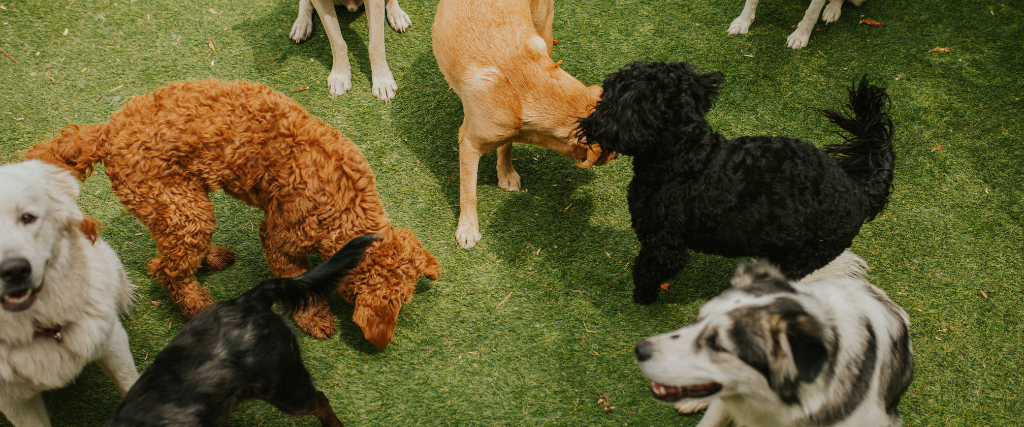Dogs are among the most social pets, in stark contrast to cats which typically prefer quiet solitude. Dogs thrive in environments that nurture their need for activity and companionship and develop deep connections with owners who return their affection and match their playfulness.
However, a dog owner can’t always keep up with their dog’s constant desire for playtime and trips to the dog park. Work and family obligations mean dogs sometimes spend hours alone entertaining themselves. Sometimes, that leads to the dog feeling bored, and that emotion can translate into negative behaviors. Likewise, dogs can be affected by separation anxiety when left alone, leading to bad behavior.
Bored dogs often chew furniture, bark excessively, dig into couch cushions, eliminate in the house, or become aggressive with other household pets. Fortunately, several tips and tricks exist to conquer your dog’s boredom and spare your furniture and shoes from destruction.
1. Burn off Energy
A dog exhibiting destructive behaviors is often a bored dog with energy to burn. When you know you need to leave your dog alone for a few hours, spend some time helping them burn off their excess energy first, so they remain calm while you’re away. With any luck, they’ll sleep those hours away instead of tearing into your couch cushions. Take them for a long walk, bring them to the dog park to run freely, or take them along on your run. Certain breeds also do exceptionally well with agility sports, which expends plenty of energy.
If you work outside the home and leaving your dog home alone for several hours is a regular occurrence, shift your morning routine so that your dog has burned off most of their morning energy before you leave the house.
Ways to help your dog burn energy before work include:
- 30-minute neighborhood walk
- Going for a run with you
- 15-minute game of fetch in the yard
- A fast-paced 15-minute play session
- An energetic game of tug-of-war

2. Buy a Few Interactive Toys
The marketplace for unique dog toys has exploded in recent years and includes several variations of interactive toys that keep dogs busy for hours. Interactive toys are also excellent for your dog’s mental health by stimulating their brain along with their body. Consider purchasing a food dispensing toy that rewards your dog with a treat once they figure out the puzzle, or a multi-part toy that requires your dog to remove a smaller toy from inside a larger one, leaving them with two toys to play with once they’re successful.
Another helpful tip is to purchase a handful of new toys for your dog, and rotate access to them. A new toy grabs a dog’s attention for considerably longer than their old toys, and by removing them and reintroducing them only occasionally, your dog will become excited and engaged every time they see the toy is back.
When researching new toys, be cautious of toys with small buttons and other embellishments that are easily chewed off. These toys are intended to be used by your dog when you’re not around; therefore safety is of the utmost importance.
3. Hire a Dog Walker
Dog walkers have become increasingly popular in recent years, as the “gig economy” has taken hold and individuals are generating income by completing various tasks throughout the day. A dog walker visits your home once or twice daily while you’re at work to take your dog outside for some fresh air and to expend some energy. While the dog walker might only spend 30-45 minutes with your dog, it helps break up those hours away from you and gives them an outlet for their energy that they’ll look forward to every day. Once a dog understands their new routine with a dog walker, they are far less likely to be destructive when alone in your home.

4. Invest in a Dog Training Class
Today’s dog training classes offer far more than they did just five years ago. Dog owners can choose between obedience training, agility training, clicker training, swim lessons, trick training, circuit training, and more. Each of these programs stimulates both their mind and body, expending energy while training them to use their energy in healthier ways. Many training facilities offer packages or drop-in services, making it convenient to leverage this option regularly or on a whim.
5. Consider Doggie Daycare
Some dogs need companionship around the clock, so other methods of tackling their boredom won’t succeed in the long term. Research local doggie daycare facilities and have your dog join you on a tour. These professional establishments offer structure to your dog’s day, with plenty of playtime and interaction with other dogs. It also allows your dog to be monitored throughout the day instead of leaving them home alone and wondering if boredom has resulted in any bad behaviors. Before enlisting the services of a doggie daycare, do your homework by checking online reviews, contacting references, and observing both the dogs and staff at the facility.
By tackling your dog’s boredom, your days of coming home to chewed furniture, ruined shoes, and torn couch cushions will be replaced with a happy dog greeting you at the door. Contact your local primary care veterinarian to learn more about dog behavioral issues caused by boredom.
